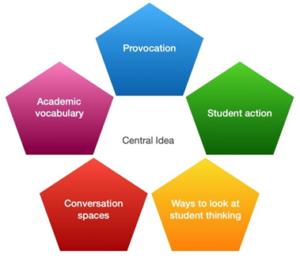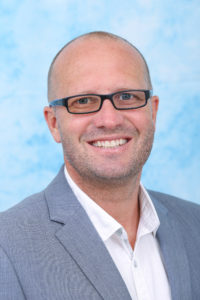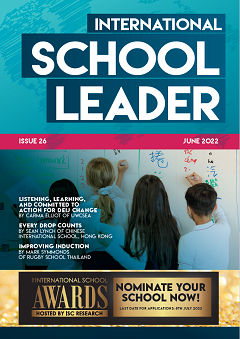By Andrea Morgan, Jon Butcher and Aisha Kristiansen
Berlin Brandenburg International School won the Ethical Values Award at the International School Awards 2022 for its Growing Up initiative. The project was piloted in the Early Education Programme and received widespread acclaim from the judges who proposed it as an approach that “all schools could model”.
The Growing Up initiative was designed to support the development of ethical values in our learners as they grapple with the big questions about themselves and their role in the world. Explicit investigations into ethical dilemmas have been woven into the fabric of the unit of inquiry, taking the students on a journey of self-discovery. The Growing Up initiative challenges our students to develop their moral compass, as they begin to see themselves as real-world change-makers.
Thinking about the ‘why’
In an ever-increasingly complex world, educational institutions need to actively consider and implement ways to explicitly develop their students’ ethical understandings. From climate change to DEIJ (diversity, equity, inclusion and justice) work, solving the spectrum of modern-day challenges will heavily depend on schools becoming organisations that can facilitate rich dialogue about how to solve some of the world’s greatest issues. If we are to reimagine traditional models of education, schools will also need to invite, facilitate and celebrate student action.
At Berlin Brandenburg International School (BBIS), our mission is ‘to inspire everyone in our learning community to be responsible, compassionate global citizens who make a difference through inclusion, innovation and action’. With this at the heart of the project, it was important for the primary school to start the journey with our youngest learners. Young children are often underestimated in their ability to think deeply about meaningful issues. Piloting the programme with this group allowed us to encourage very young learners to see themselves as agents of change, at a time when they are starting to develop their ethical perspectives.
Reflecting on the ‘how’
Working with concept-based inquiry leader, Carla Marschall, we began designing a thought-provoking unit of inquiry. This targeted module would specifically focus on developing ethical values in the students through the power of story. Using Storypath as a vehicle to engage the hearts and minds of these young and capable children, the provocation ‘fairies as stewards of the forest’ began to take shape.
Using the OECD Future of Education and Skills transformative competencies, three important criteria were identified in the curriculum design stage:
1. Reconciling tensions and dilemmas (experience interconnectedness and inter-relations)
2. Taking responsibility (reflect and evaluate one’s own impact)
3. Creating new value (innovate to be future-ready and to shape better lives)
From this point, it was important to identify a set of criteria that all modules would contain when planning the unit. The team looked to the Ethical Capability Framework in the Australian Curriculum to build a set of highly effective success criteria.
It was established that all modules would contain five key components:

Creating a developmentally appropriate provocation – perhaps at the start of a unit or as a culminating engagement – can ignite connection and frame desired action. The introduction of a shared academic vocabulary raises the bar for quality dialogue. The creation of a safe, yet challenging, conversation space is crucial, as the students start to play with new ideas and language. The design team should also consider ways in which to look and listen closely, so as to not interrupt student thinking. Finally, it is important to value and support the student action that transpires, and to celebrate and honour their advocacy.
Heavily documenting the students’ learning journey was an integral part of the project’s success. Our EdTech Integrator worked closely with the team to explore the different ways to document learning. Listening to student dialogue and discussions, curating photos and videos of engagement, as well as capturing student understanding through drawings and emerging writing all combined to create powerful evidence of impact.
We reflected on the students’ experiences, including analysing the documented learning. It provided an intentional space for the core design team, who were now being driven by the students themselves, to plan the next steps in the learning process. You can find out more about ‘LAST’ (Looking ‘closely’ At Student Thinking) in our recent article, ‘The Adaptive Work of the Teacher’, published by ECIS. The ethical values project provided clear evidence of impact for an area of student development that is often difficult to capture.
Planning the ‘where to next’
The design team wanted to create a protocol that moved the project beyond a one-off experience for the students. If we were to honour the capable child, they deserved continuity and ongoing development. As with all succession planning, a strategic handover was needed. From one team to the next, passing on the learning momentum was the essence of the Growing Up initiative. Enabling this handover meant that time release was required for the former teacher to share evidence of learning with the new teacher, within the constructs of the current academic year. As schools, we regularly schedule handover meetings at the end or start of the academic year, only to miss the ‘just in time’ moments that help inform and plan for future success.
It is this commitment that is the Growing Up initiative: a true belief in the child’s intellectual capabilities, a collective effort to grow the students and the knowledge that our learners are true agents of change.
You can read more about this impactful project on our website.
Our Top Tips
- Map ethical development on a continuum of learning using a sequential curriculum, in a context that fits.
- Intentionally plan for opportunities to inquire, learn and take action that is developmentally engaging.
- Capture meaningful evidence of learning in multiple formats.
- Schedule time to have reflective conversations with, and beyond, teaching teams.
- Share and celebrate the success with your school community and beyond.
Andrea Morgan is Early Education Teacher and Grade Level Lead, Jon Butcher is Primary Principal,and Aisha Kristiansen is EdTech Integrator at Berlin Brandenburg International School, Germany. They are the team behind the Growing Up initiative. Connect with them on LinkedIn: Andrea Morgan, Jon Butcher, Aisha Kristiansen.





